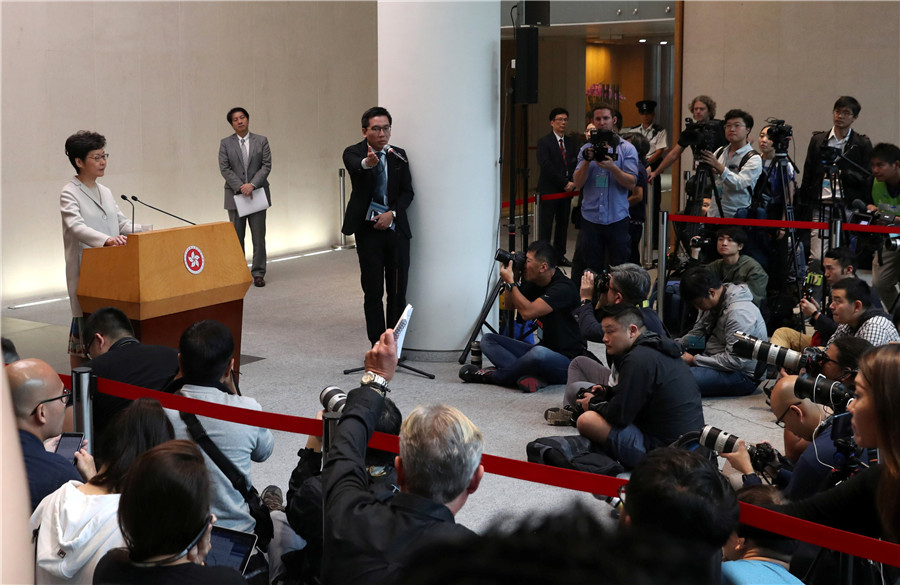
Hong Kong Chief Executive Carrie Lam Cheng Yuet-ngor (left) meets with the media in Hong Kong on Tuesday. LEAH MILLIS/REUTERS
Top diplomat says passage of act has seriously harmed China's interests
China's top diplomat, Yang Jiechi, has urged the United States to immediately take measures to prevent the recently passed Hong Kong Human Rights and Democracy Act from becoming law and to keep its hands off Hong Kong affairs.
In an interview with Xinhua News Agency released on Tuesday, Yang, a member of the Political Bureau of the Communist Party of China Central Committee and director of the Office of the Foreign Affairs Commission of the CPC Central Committee, said China has lodged stern representations with the US over the passing of the bill in the US Congress.
The passage of the bill, despite firm opposition from the Chinese side, is a blatant interference in China's internal affairs and seriously breaches international law and basic norms governing international relations.
Yang emphasized that Hong Kong affairs are purely China's internal affairs that allow no interference from foreign forces, adding that the US bill has seriously harmed China's interests and Hong Kong's prosperity and stability.
Yang said Washington's attempt to interfere in China's internal matters and to hinder China's development by making use of Hong Kong affairs will not succeed.
Adding that the most pressing task now is to stop violence and restore order in Hong Kong, Yang said Hong Kong will absolutely maintain long-term prosperity and stability with resolute support from the Chinese mainland.
The top diplomat stressed that the Chinese government is determined to safeguard national sovereignty, security and its development interests, implement the "one country, two systems" policy, and oppose any foreign interference in Hong Kong affairs.
Chinese Vice-Foreign Minister Zheng Zeguang summoned Terry Branstad, the US ambassador to China, on Monday to protest the passing of the act.
Speaking at a media briefing on Tuesday, Hong Kong Chief Executive Carrie Lam Cheng Yuet-ngor thanked residents of the special administrative region for voting in an orderly manner on Sunday despite a relatively volatile environment, saying she hoped the peace over the weekend reflected a voice by people against violence.
She stressed that after the past five or six months, Hong Kong people have realized very clearly that Hong Kong can no longer tolerate the chaotic situation.
"Everybody wants to go back to their normal life, and this requires the concerted efforts of every one of us," she said. "Resorting to violence will not give us that way forward."
She added that pro-establishment parties will continue to serve the public with dedication.
Opposition candidates secured almost 90 percent of 452 district council seats in Sunday's election.
"The nature of these elections is simply to elect district council members to serve on the 18 district councils," Lam said. "It is not for the government and for myself to give it another interpretation, because by law we are electing members to serve on the district councils."
She added that Sunday's district council election, unlike previous district council elections, had a more political dimension to it - given the large number of voters coming out to cast their vote, perhaps not only to select a preferred candidate for the district council, but also to express a view on many issues in society.
The SAR government will seriously reflect on voters' views and improve governance in the future, Lam said in a statement on Monday.
The next step, she said, is to go forward by engaging with the people, and the SAR government has started a public dialogue with the community.
"Unfortunately, with the unstable and violent environment and chaotic situation, I could not do more of that sort of engagement. I hope that the environment will allow me to do it now," she said.
The SAR government is turning to the experience of other places, such as the United Kingdom after the 2011 Tottenham riots. In August 2011, a gathering of around 200 protesters demanding answers in the death of a man shot dead by police culminated in 12 hours of rioting that saw brazen looting spread across north London's suburbs. A panel commissioned by the UK government came up with recommendations on dealing with the criminals involved in vandalism and looting, restoring business and community confidence, tackling deep-rooted social issues and improving relations between the police and the public.
Lam said, "We are now modeling on that arrangement to set up an independent review committee to look at the causes of the social unrest that has lasted for so long in Hong Kong, to identify the underlying problems, social, economic, or even political, and to recommend measures that the government should take."
Cai Hong contributed to this story.


